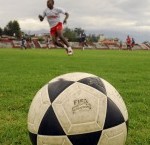I lived in the Valle del Chota town of Ambuqui as a Peace Corps Volunteer between the years of 2005-2007. This is when “La Selección de Ecuador” was electrifying soccer pride to an unprecedented level for their country. This was when foreigners were asking what African nation Ecuador belonged to. This was also when I was teaching English in six different schools in the Valle del Chota and I was able to witness what soccer truly meant to this area. Soccer is a sport that brings the community together.
Wives, husbands, grandparents, children, vendors, and even the local dogs participate in the culture of weekend soccer matches. The definition of passion does not do justice to what soccer really means to a community like this. Soccer is not a way of life, it is life. For example, a typical punishment to a student would be to say, “No soccer at recess,” or “I will take your soccer ball away.” While these techniques work to transform children’s behavior, everybody knows that it would be considered sacrilegious to actually follow through with the threat.
In the midst of my Peace Corps tenure, I was fortunate to witness Ecuadorian soccer-fervor on the international level. Thanks to a sports-fanatic brother who gave me the amazing opportunity, I traveled to the 2006 World Cup in Germany. With nine out of eleven of the starters on the Ecuadorian team of African descent, the question posed round the World Cup venues was: “Wow, what part of Africa are those Ecuadorians from?” I was blown away by the misconceptions surrounding the country I had grown to love and respect. Here, I was in Germany with people from all corners of the globe, and I had an insider perspective due to my unique experience as an American living as a current resident of the Valle de Chota. Daily, I experienced the life of an Afro-Ecuadorian, and it was astonishing to witness how the world was viewing these “African” people. What these people weren’t seeing was that the people of the Valle de Chota – including the spectacular soccer players – come from poor, rural communities, from a people who have faced centuries of oppression and racial discrimination.
 DreamTown has the awesome potential to create an awareness of the Afro-Ecuadorian people of the Valle de Chota, as well as to provide a greater understanding of marginalized people everywhere. This story – and stories like this – need to be told. DreamTown can expose the truth about the success of a few professional Ecuadorian soccer players…and more importantly, it can reveal the story of the reality of a typical soccer player from the Valle de Chota. The fact still remains the same: poverty is rampant and soccer is an outlet for rising above it. The Afro-Ecuadorian soccer professionals are an inspiration for the Valle de Chota, they are an inspiration for their entire country…and DreamTown will allow their story to inspire the world. As the locals always say, “Sí, se puede!”
DreamTown has the awesome potential to create an awareness of the Afro-Ecuadorian people of the Valle de Chota, as well as to provide a greater understanding of marginalized people everywhere. This story – and stories like this – need to be told. DreamTown can expose the truth about the success of a few professional Ecuadorian soccer players…and more importantly, it can reveal the story of the reality of a typical soccer player from the Valle de Chota. The fact still remains the same: poverty is rampant and soccer is an outlet for rising above it. The Afro-Ecuadorian soccer professionals are an inspiration for the Valle de Chota, they are an inspiration for their entire country…and DreamTown will allow their story to inspire the world. As the locals always say, “Sí, se puede!”
Jordan Bailey, Philanthropiece Field Coordinator, comments on the Dream Town Documentary aka the “Hoop Dreams” of Ecuador.

